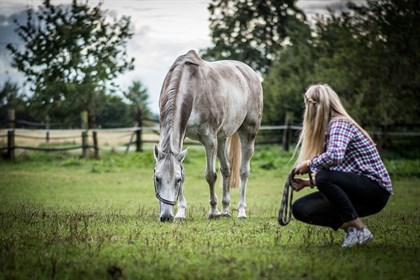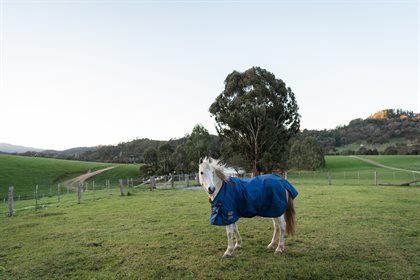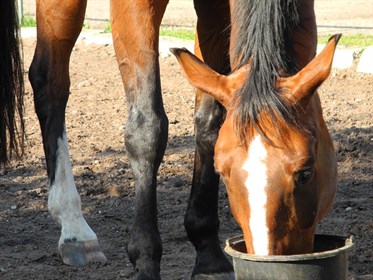|
This article has appeared previously with Equestrian Life. To see what's in our latest issue, click here.

As a horse gets older its ability to firstly chew roughage and then digest it can be diminished.
BY DAVID NASH
FIRST WE NEED to categorise what constitutes an old or geriatric horse and what stage of condition and activity it is at. Generally, a horse over 15 years that is in light to no work would be considered geriatric. With the advent of better veterinary care and anthelmetics, or wormers, horses are consistently living and performing at high standards well into their twenties. Obviously there are exceptions to the rule but we will look at the average animal.
Like humans, as horses get older their ability to digest feed diminishes; as their teeth erode and elongate, their ability to chew and assist with digestion is also reduced. Key selection of feeds for geriatric horses needs to be considered to enable your horse to still flourish.
PREPARATION FOR WINTER
As winter approaches, I would like to see your older horse in a condition score that is well covered and moderate to fleshy. The reason for this is that keeping warm during winter can increase a horse’s energy requirement 25 per cent. If we are not matching its energy requirements, the horse will call on its body reserves and lose condition as a result. If your horse is not rugged over winter, I suggest investing in a quality rug that will keep your horse warm and dry. If you can help shield your horse from the wind and rain it will save your horse from using valuable energy trying to keep warm. Ensure your horse has shelter and/or a windbreak. Shelters accompanied with rugging will greatly assist in maintaining condition. It would also be wise to have your horse’s teeth checked by a qualified dentist, and ensure you have the correct worming program in place. If you are unsure consult your veterinarian.

In cooler weather, it's a good idea to invest in a quality rug that will keep your horse warm and dry.
THE DIET
When designing a diet for your older horse you need to take into consideration several aspects, such as current weight, desired weight, metabolism, climate and activity level. For example, a horse in a warm environment will not be under the same stress as a horse in the high country of Victoria during winter. An easy way to assess your horse’s requirements is to consult your nutritionist. Many companies have ration evaluators that can help you discover what your horse’s requirements are. Accompanied with a history of what you have fed in the past and condition score, condition targets and proposed workloads, a qualified nutritionist will be able to give you a suggested diet and/or your horse’s requirements so you can develop your own feeding program.
Every nutritionist will say you start planning a horse’s diet with roughage, or fibre. As a horse gets older its ability to firstly chew roughage and then digest it can be diminished. Selecting high quality (softer to the touch) roughage sources such as hay and chaff will enable the horse to derive more nutrients from the roughage source. A simple grab test will determine the digestibility of the roughage. The softer it is, generally the more digestible; the harder/stalkier it is, the less digestible. One advantage of a high fibre diet is that when horses ferment the fibre in their large intestine, a byproduct of this digestion is heat. Internal heat being produced by the horse will help keep them warm during cold and windy periods. I would suggest basing a horse’s diet on approximately 1.5 per cent of their bodyweight in roughage. This could be a combination of pasture, hay and/or chaff/super fibres etc.
DO I NEED TO SUPPLEMENT FEED DURING WINTER?
The extent to which we will supplement feed will depend on what is naturally available to our horse, its condition and workload. If there is adequate pasture and the horse is maintaining condition, I would suggest a supplement such as a block or balancer pellet/powder to ensure that they are receiving their trace minerals and vitamins. This will assist in bone and joint integrity, as well as general health and body function. Remember, they are not as resilient and adaptive as they once were. If they require additional supplementation of prepared feed I would suggest feed that has been cooked to assist in digestion as well as feeds that contain “super fibres”. These fibres are very well digested by the animal but do not have high level of starches, which can negatively affect the horse. There are many prepared horse feeds designed for the older horse. Nearly all of them will have cooked grains for increased digestion, elevated levels of vitamins and minerals, and super fibres. Some will have elevated levels of omega 3s and/or nuetracueticals such as glucosamine, designed to assist with joint inflammation. All of these feeds are designed with the older horse in mind. You need to ensure if you use these feeds that you take care to read the label to ensure you are feeding the correct rate. If you are feeding a product that requires to be fed at 4kg a day, and you are only feeding 1kg a day, obviously you will not be meeting your horse’s nutrient requirements. If 1kg a day is maintaining your horse’s condition, I would suggest using a feed that is designed to be fed at this rate.

The extent to which we will supplement feed will depend on what is naturally available to our horse, its condition and workload.
If your older horse is suffering from metabolic problems such as EMS, has Cushing’s syndrome or is prone to laminitis, please consult your veterinarian and nutritionist for advice specifically for your horse.
The key message for caring for you older horse is to monitor them every week or so. Take their rug off and check their condition. If they have changed, make the adjustment to their diet or their environment. It is a lot easier to maintain condition than have to work to build back condition of your horse.
Please remember that when coming out of winter and spring is underway, the pasture will be in a rapid growth phase. You will need to keep a watchful eye on all of your horses to ensure they maintain their condition and do not gain weight too fast.
READ THE LATEST NEWS ARTICLES HERE

|

